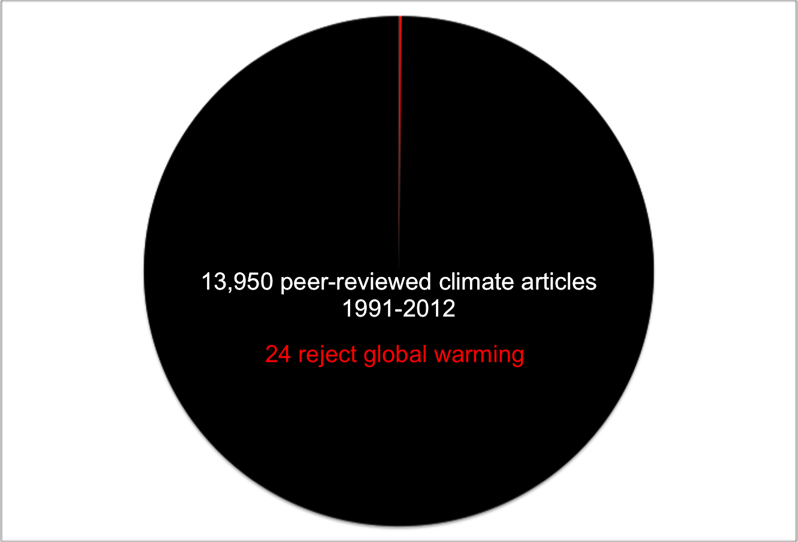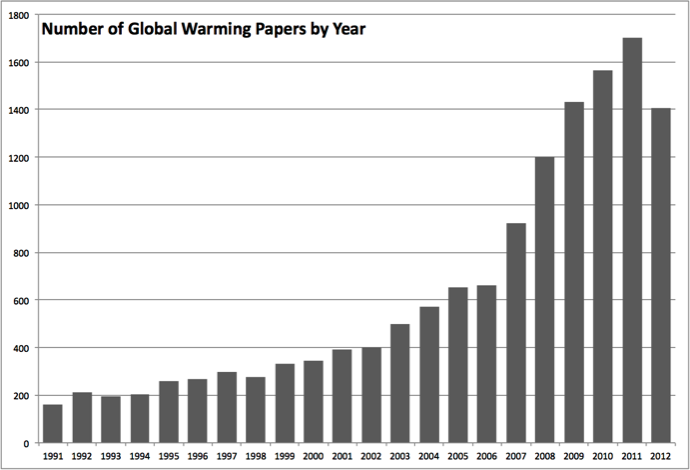The Achilles Heel of Climate Denialism

If ever there were a lawn dart which should incapacitate global warming deniers, the image below would be that dart.
In an effort that can be re-performed with ease, Jim Powell, former science advisor to Presidents Ronald Reagan and George H. W. Bush, shows us what a query in the Web of Science database reveals. The Web of Science is a public database indexed from 1900 – present. His basic search parameters were the keywords “global warming” or “global climate change” from 1991 – 2012. He found that there have been 13,950 peer-reviewed papers on global warming published in the last 21 years by 33,690 different authors from over 20 different countries. Out of that population, just 24 are papers of dissent. That’s 0.17%. If you drill down further, you find that of those 24, even fewer flat-out reject global warming, with the balance accepting that the earth is warming but demurring that humans are the cause.
This follows from a similar survey in 2004 by Naomi Oreskes, who found that of all peer-reviewed abstracts published between 1993 and 2003, not a single paper rejected the consensus position that today’s global warming trend stems from unnatural causes. This latest survey pushes the radar out by another decade.
Regardless of how entrenched one’s views are within the denialist ecosystem, reality can only be eschewed for so long. With each passing year, more and more data is stacked in favor of global warming and its rock-solid connection to greenhouse gas emissions. I aim to update this pie chart annually. It should preface any discussion where disagreement exists over the reality of global warming, especially because it explicitly signifies that the contention exists only outside the scientific community.
Powell’s second graph shows the near-monotonic increase in research conducted on this issue since 1991. Not only is there strong consensus, but an ever-increasing number of studies by an ever-increasing number of climate scientists around the world are being funded to study what is most certainly not a “global conspiracy.”
Since this chart has gone viral, some have decried its use as a persuasion tool as being ad populum or an argument from authority. Of course, these ripostes demonstrate a critical misunderstanding of how science operates. There is no centralized authority in any scientific discipline. There’s no elected spokesman who speaks for all geologists, for example. There’s no emperor of biology who determines what is true for the rest in the field. Nor is there a clandestine “supergroup” of climate scientists who have the final word on global warming. These terms do not apply to science, as there are mechanisms built in precisely to prevent these types of influences. As Powell states, “If there is disagreement among scientists, based not on opinion but on hard evidence, it will be found in the peer-reviewed literature.” The unraveling of the climate denialist camp (or of science deniers in general) lies in the independently derived literature. As the many thousands of published papers attest, science is the most decentralized of disciplines.
If, instead of citing the overwhelming consensus found in peer-reviewed research someone were to appeal to the opinion of a single spokesperson, such as Neil deGrasse Tyson, then the argument from authority criticism would in fact be valid. As it stands, any objections to the established science will acquire credibility to the extent they acquire empirical support.
More ironically, it is the denialist community that falls prey to the fallacy of authority. From Michael Crichton to Donald Trump to ExxonMobil CEO Lee Raymond to virtually the entire 2012 GOP presidential race, deniers have persistently used their positions of power to sow disinformation in volume and to dissuade the public from accepting the scientific consensus, having neither the qualifications nor the data to prop up their claims. What deniers lack in credibility they attempt to reprovision with popularity and status.
As for ad populum, scientific pronouncements do not fluctuate under the guise of opinion and belief, but according to evidence. Pointing to conclusiveness here is no more ad populum than the connection between light alloys and flight aerodynamics is ad populum or the well-understood relationship between wire gauge and electrical signal fidelity is ad populum, or the conclusive evidence for bioevolution is ad populum. Fortunately, science does not operate under such pretenses of popular majority. On the contrary, science is the unapologetic antidote to conjecture and prejudgments, a plane of neutrality in an otherwise tendentious world. The data, and the sheer volume of it as of 2012, speaks for itself.
As expressed here and elsewhere ad nauseum, global warming merits our attention and resources, and it will require a global solution to mitigate its effects. We are right on the heels of the UN’s COP18 Climate Conference 2012 in Doha, Qatar, where international leaders hope to map out some cooperative resolutions.
Source: Why Climate Deniers Have No Scientific Credibility – In One Pie Chart
Feature image via c2es.org




Comments